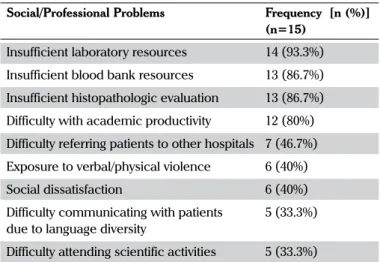335
Letter to the Editor
A survey of hematologists on compulsory health
service in Turkey
Türkiye’de zorunlu hizmet görevi yapan hematoloji uzmanlarına yönelik bir
anket çalışması
Zeynep Arzu Yeğin
1, Mutlu Arat
21Department of Hematology, Konya Education and Research Hospital, Konya, Turkey 2Department of Hematology, İstanbul Bilim University, İstanbul, Turkey
Address for Correspondence: Dr. Zeynep Arzu Yeğin, Department of Hematology, Konya Education and Research Hospital, Konya, Turkey
Phone: +90 332 323 67 09 E-mail: zeyneparzuyegin@gmail.com doi:10.5152/tjh.2011.91
To the Editor
The quality of health care is closely related to the level of physician job satisfaction, which depends on several factors, including working conditions, income, hospital resources and workload [1-3]. Compulsory health service was instituted by the Turkish Ministry of Health in 2005 (www.saglik.gov.tr), which is a post-graduate program that requires practitioners and specialists to work 300-600 days in underserved regions of the country.
This nationwide survey was conducted in 2010 by the Turkish Hematology Society in order to inves-tigate lifestyle, working conditions, and job satisfac-tion among hematologists fulfilling their compulsory health service. The survey included 2 sections for collecting social and professional data. The primary results of the survey are detailed in the Table.
In all, 15 hematologists (male/female: 9/6; age range: 33-40 years; married/single: 11/4) from 11 cit-ies (Adana, Ankara, Antakya, Bursa, Diyarbakır, Erzurum, Gaziantep, İstanbul, Konya, Şanlıurfa, and Trabzon) were asked to complete a 33-item elec-tronic survey comprised of general questions
con-cerning the social and professional circumstances in the region in which they were working.
Social and financial dissatisfaction rate among the respondents were reported to be 40% and 60% respectively. The overall job satisfaction rate was 66.7%. Among the 15 respondents, 6 (40%) were confronted with verbal/physical violence by patients and/or coworkers at least once. This is a remark-able issue which might represent a common fact for a particular group of physicians working in simi-lar conditions. Additionally, 26.7% of the respon-dents experienced social adaptation problems. Consequently, job dissatisfaction among the hema-tologists should not be underestimated as it might cause an adverse impact on patient care as well. In consideration of inappropriate physical conditions and inadequate diagnostic resources, approximate-ly 45% of patients are directed to larger centers, which is not consistent with the primary goal of compulsory health service.
The respondents were asked to evaluate the quality of hospital resources. The main defects were notified in laboratories, blood banks, and his-topathology departments. As a result, hematologists
seemed to treat predominantly benign hematologic disorders like iron deficiency anemia. This primary step health service with inadequate clinical practice and scientific efficiency causes a professional dete-rioration that decreases the scientific productivity as well. Optimum working conditions should be adjusted in order to overcome this obstacle.
In conclusion, the results of our survey highlight the main social and professional problems
experi-enced by Turkish hematologists performing com-pulsory health service. Hematologists would display a better performance in patient care and academic course underneath more favorable infrastructure and working conditions. Strategies are urgently needed to ensure job satisfaction among hematolo-gists on compulsory heath service.
Conflict of interest statement
The authors of this paper have no conflicts of interest, including specific financial interests, rela-tionships, and/or affiliations relevant to the subject matter or materials included.
References
1. Wada K, Arimatsu M, Higashi T, Yoshikawa T, Oda S, Taniguchi H, Kawashima M, Aizawa Y. Physician job satisfaction and working conditions in Japan. J Occup Health 2009;51:261-6. [CrossRef]
2. Deshpande SP, DeMello J. An empirical investigation of factors influencing career satisfaction of primary care physicians. J Am Board Fam Med 2010;23:762-9.
[CrossRef]
3. Magnavita N, Fileni A, Bergamaschi A. Satisfaction at work among radiologists. Radiol Med 2009;114:1330-44.
[CrossRef]
Yeğin et al.
A survey for hematologists Turk J Hematol 2011; 28: 335-6
336
Table 1. The Primary Social and Professional Problems Reported by Hematologists
Social/Professional Problems Frequency [n (%)] (n=15)
Insufficient laboratory resources 14 (93.3%) Insufficient blood bank resources 13 (86.7%) Insufficient histopathologic evaluation 13 (86.7%) Difficulty with academic productivity 12 (80%) Difficulty referring patients to other hospitals 7 (46.7%) Exposure to verbal/physical violence 6 (40%) Social dissatisfaction 6 (40%) Difficulty communicating with patients 5 (33.3%) due to language diversity
Difficulty attending scientific activities 5 (33.3%)
